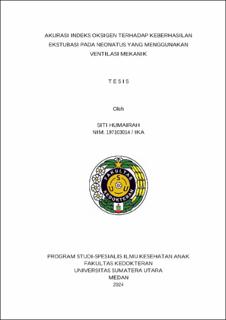Akurasi Indeks Oksigen terhadap Keberhasilan Ekstubasi pada Neonatus yang Menggunakan Ventilasi Mekanik
The Accuracy of Oxygen Index in Relation to Successful Extubation in Neonates Undergoing Mechanical Ventilation

Date
2024Author
Humairah, Siti
Advisor(s)
Lubis, Bugis Mardina
Sianturi, Pertin
Metadata
Show full item recordAbstract
Backgound: Acute respiratory insufficiency often occurs in neonates requiring mechanical ventilation in the NICU as a countermeasure by intubation. Prolonged intubation can lead to complications such as ventilator-associated pneumonia, airway trauma and bronchopulmonary dysplasia (BPD). These complications often arise due to difficulties in determining the right time to extubate neonates. Further evaluation is needed on the accuracy of the oxygen index as a parameter of extubation in neonates
Method: We conduct observational study with diagnostic test to evaluate the accuration of oxygen index with extubation success in neonates aged 0-28 days using mechanical ventilation on Haji Adam Malik Central General Hospital, Medan, North Sumatera, Indonesia during September 2021-2022.
Result: This study was followed by 50 neonates using mechanical ventilation who were treated in the neonatal intensive care unit (NICU), 30 boys (60%) and 20 girls (40%). Seven neonates (14%) experienced failed extubation and 43 neonates (86%) were successfully extubated. The results of the oxygen index examination showed an average of 1.62 (SD = 1.41). ROC curve in predicting the success of extubation were 84% with a p value = 0.004 and 95% CI 65.1% - 100% with a cut off of 1.1.
Conclusion: There was a significant relationship between the oxygen index and extubation success in neonates using mechanical ventilation
Collections
- Master Theses [363]
